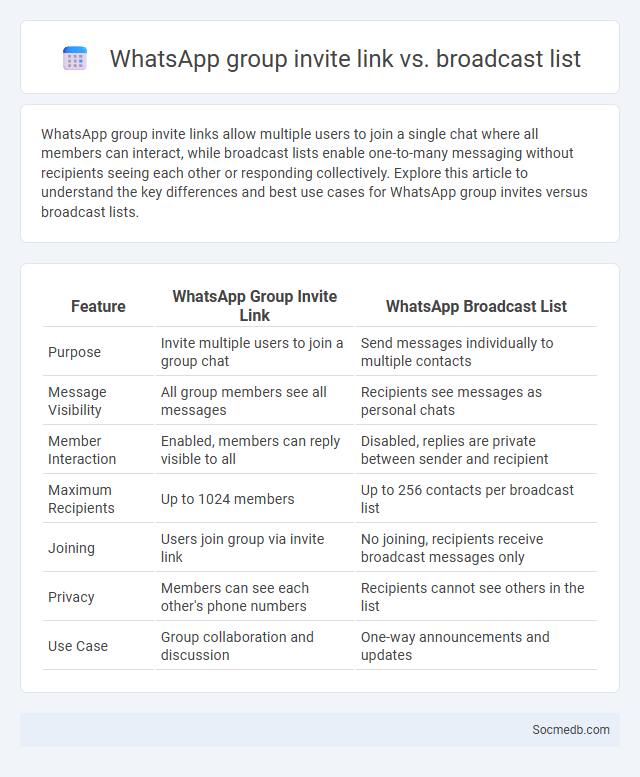
Photo illustration: WhatsApp group invite link vs broadcast list
WhatsApp group invite links allow multiple users to join a single chat where all members can interact, while broadcast lists enable one-to-many messaging without recipients seeing each other or responding collectively. Explore this article to understand the key differences and best use cases for WhatsApp group invites versus broadcast lists.
Table of Comparison
| Feature | WhatsApp Group Invite Link | WhatsApp Broadcast List |
|---|---|---|
| Purpose | Invite multiple users to join a group chat | Send messages individually to multiple contacts |
| Message Visibility | All group members see all messages | Recipients see messages as personal chats |
| Member Interaction | Enabled, members can reply visible to all | Disabled, replies are private between sender and recipient |
| Maximum Recipients | Up to 1024 members | Up to 256 contacts per broadcast list |
| Joining | Users join group via invite link | No joining, recipients receive broadcast messages only |
| Privacy | Members can see each other's phone numbers | Recipients cannot see others in the list |
| Use Case | Group collaboration and discussion | One-way announcements and updates |
Introduction to WhatsApp Group Communication Features
WhatsApp group communication features enable seamless interaction among multiple participants through real-time messaging, voice, and video calls. Users can share multimedia files, including images, documents, and voice notes, fostering collaborative and dynamic conversations. Group admins have control over settings such as adding or removing members, managing group information, and setting permissions to ensure a focused and secure communication environment.
What is a WhatsApp Group Invite Link?
A WhatsApp Group Invite Link is a unique URL that allows users to join a specific WhatsApp group without needing a direct invitation from an existing member. This link simplifies group access by enabling sharing through various platforms, increasing the ease of communication and collaboration among participants. Group admins can generate, share, or revoke these links to control membership and maintain privacy within the group.
Understanding WhatsApp Broadcast Lists
WhatsApp Broadcast Lists allow you to send messages to multiple contacts simultaneously without creating a group, maintaining individual privacy and personalized communication. This feature is ideal for businesses or individuals who want to share updates, promotions, or announcements efficiently while ensuring recipients receive messages as regular chats. Using Broadcast Lists enhances your social media strategy by increasing reach and engagement without overwhelming your audience.
Group Invite Links vs Direct Group Invitations
Group invite links enable easy sharing and access, allowing anyone with the link to join your social media group instantly, which boosts organic growth and engagement. Direct group invitations offer controlled access by sending personalized invites to specific individuals, ensuring targeted community building and enhanced privacy. Your choice between these methods depends on whether you prioritize rapid expansion with public access or curated membership with exclusivity.
Key Differences: Group Invite Link vs Broadcast List
Group invite links allow multiple users to join a shared space where members can interact, share messages, and participate in discussions, ideal for collaborative communication on social media platforms. Broadcast lists enable you to send messages to multiple contacts simultaneously without creating a group, preserving privacy and preventing recipients from seeing each other's responses. Choosing between a group invite link and a broadcast list depends on whether your goal is interactive engagement or one-way communication on your social media channels.
Use Cases for WhatsApp Group Invite Links
WhatsApp group invite links enable seamless community building by allowing quick access for members to join discussions, coordinate events, or share updates without manual approvals. Your team can enhance collaboration by distributing these links in newsletters, websites, or social profiles to attract target audience engagement. Leveraging invite links streamlines onboarding processes in educational, professional, and social contexts, improving communication efficiency and user interaction.
Use Cases for WhatsApp Broadcast Lists
WhatsApp Broadcast Lists enable businesses to efficiently communicate with multiple customers simultaneously while maintaining personalized messaging, ideal for promotions, event invitations, and important updates. You can segment your audience by interests or demographics, ensuring targeted content delivery that drives higher engagement rates. This feature supports seamless two-way communication, fostering stronger customer relationships and boosting brand loyalty.
Pros and Cons of Group Invite Links
Group invite links offer a convenient way to quickly grow social media communities by enabling easy sharing and instant access for new members, enhancing engagement and collaboration. However, they can also pose security risks, such as unauthorized access or spam, and may lead to reduced control over group membership quality. Balancing ease of use with privacy settings and moderation is essential for maximizing the benefits while minimizing potential drawbacks.
Pros and Cons of Broadcast Lists
Broadcast lists enable you to send messages to multiple recipients simultaneously, enhancing communication efficiency and saving time for personal or business use. However, their limitations include message delivery restrictions if recipients have not saved your contact, and the inability for recipients to see each other's responses, which can hinder group interaction. Balancing these pros and cons helps you decide if broadcast lists align with your social media communication strategy.
Choosing the Right Feature for Your Needs
Selecting the right social media feature depends on your specific goals, whether it's increasing engagement, driving traffic, or building brand awareness. Features like Stories enable real-time interaction and ephemeral content, while Reels or TikToks focus on short-form, viral video formats that boost visibility. Understanding platform-specific tools--such as Instagram Shopping for e-commerce or LinkedIn's publishing for professional networking--ensures optimized performance for your intended audience.
 socmedb.com
socmedb.com